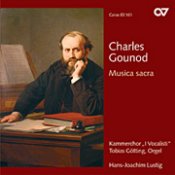Among the 21 Masses and 4 Requiems of Charles Gounod, his most memorable and popular work is the Messe solennelle de Ste Cécile (1855), a large-scale setting for soloists, orchestra and organ, filled with marvellous melodies. This composition is the concluding work of that group of Masses referred to as the “first collection.” The two Masses featured on this CD, are from the “second collection” or those composed during the last years of his life: Messe brève no. 5 in C aux séminaires (soli TBB, Choir TBB, and organ) first published in 1871 and re-issued in 1892 with the phrase séminaires; and Messe brève no. 7 in C aux chapelles (soli TB, Choir SATB, and organ), first published for two equal voices and organ in 1877, re-worked and re-issued in 1890 with the phrase aux chapelles and arranged for soli and mixed choir. Both works are atypical settings as they omit the Credo, which the congregation sang. Further, in Messe no. 7, Gounod takes a liturgical liberty by replacing the text of the Benedictus, the second half of the Sanctus, which is often treated as a solo or even a separate movement, with the first verse of O salutaris hostia (O Saving Victim). This hymn commonly sung at Benediction, is composed of the last two verses of Verbum supernum, one of the five Eucharistic hymns written by Thomas Aquinas (1225-1274) at the request of Pope Urban IV (1261-1264) for the newly instituted Feast of Corpus Christi in 1264. Given its liturgical history and use, the substitution of this Eucharistic text for the Benedictus makes sense only if its performance occurs during the consecration, which would have required impeccable timing. Even then, it is a deviation that borders on personal piety rather than corporate worship, the latter of which is the purpose of the Mass.
The delightful and lyrical Noël (1866), a Christmas song for equal voices, soli and chorus, received some notoriety in 1948, when sung by the Robert Mitchell Boy Choir in the MGM classic The Bishop’s Wife. This rendition by the women of I Vocalisti has potential but is compromised by the tense, piercing sound of the soprano soloist and the soprano section. In addition, the French is difficult to understand even when utilizing the booklet.
One of the redeeming selections on this CD is Les sept paroles du Christ sur la croix (1855, a capella, soli SATB, Choir SATB / SATB). Profoundly influenced by the music of Palestrina during his years in Rome (1840-1842), the close connection between text and music characterizes this period of Gounod’s compositions and this work. Predominantly homophonic in texture, Gounod’s descriptive musical figures, which ornament and illustrate the texts, are effectively rendered vocally, e.g., in No.4, the cascading phrase Eli, lama sabachtahni (“My God, why have you forsaken me?”) and in No. 5, the biting chromaticism on the word Sitio . . . “I thirst.”
Perhaps the best performance on this CD is Béthléem (1882-1884), a Christmas choral work (SATB) of three verses with organ interludes. Its simplicity is its joy; the obvious goal when one conducts and composes for amateur choirs.
I Vocalisti presents itself as performers of “demanding sacred and secular choral music on a professional level.” The selections presented here, highlights of Gounod’s affiliation with and affection for amateur choirs, seem at odds with the stated mission. While the general ensemble of the choir is good, there are vocal problems not worthy of “professionals”. Diction is less than desirable; pronunciation problems affect intonation, most noticeably with the tenors; placement of open vowels, particularly with the tenors and sopranos, is harsh and unpleasant; and there are actual intonation concerns. The lack of melodic contour by the choir, principally in the Mass settings, burdens the music unnecessarily. The over riding fault however, is the sound engineering (Tritonus Musikproduktion, Stuttgart, Stephan Schellmann, sound engineer). Volume levels are irritating, particularly when the soli, choir, and organ are in dialogue. In general, performance of the choir suffers at the hands of the engineers.
Even among his admirers, Gounod is known for his predictable rhythms, ordinary chromatic harmonies, particularly at the frequent cadences that illustrate what Gounod defined as avoiding “disproportion long windedness,” and what Martin Cooper terms “short-breathed” melodies. While this recording serves musicological and historical interests—demonstrating national and stylistic differences—aesthetically, it is bland.
Geraldine M. Rohling
